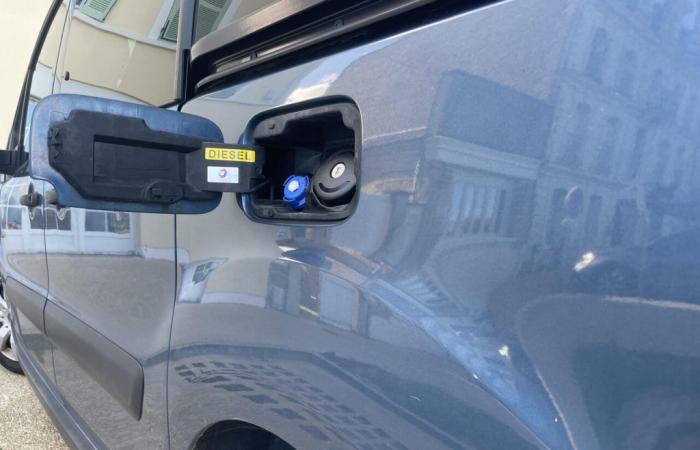Par
Briac Trébert
Published on
Oct 18, 2024 at 7:24 p.m.
See my news
Follow News
“We’re not giving up,” repeats, actu.frVéronique Louis-Arcène, lawyer at the association UFC-Que Choisir. “We wrote to the manufacturers, contacted the Directorate General for Competition, Consumer Affairs and Fraud Prevention, the DGCCRF, but also the European Commission,” she lists.
For months, the Federal Consumers’ Union has been collecting stories from owners of diesel cars who use theAdBlue additive and which multiply the hassle and expenses.
“We have received more than 5,000 testimonials,” she says. They concern vehicles marketed since 2013.
It usually starts with a check engine light coming on on the dashboard, and sometimes the car simply refuses to restart. And as the diesel vehicle fleet ages, these breakdowns risk becoming even more frequent, warns Véronique Louis-Arcène.
What is AdBlue?
AdBlue? It is a liquid additive which helps reduce emissions of polluting particles from diesel engines. It equips cars which have an SCR device (for Selective catalytic reduction).
Stored in a dedicated tank, recognizable by its blue cap, this additive is injected into the exhaust system once the engine is started and limits dangerous nitrogen oxide emissions.
It thus allows vehicles to comply with pollution standards. But the degradation of the liquid from 25°C, and, above all, its crystallization, would not have been properly taken into account by manufacturers for several years, estimates UFC-Que Choisir.
An additive that can crystallize in the tank
In particular, it happens that this additive crystallizes in the tank, and the car breaks down.
On the forum of the consumer association UFC-Que Choisir, there are dozens of people who have sometimes experienced several breakdowns, and who mention bills for repairs to tanks or probes, sometimes very expensive.
“For months, UFC-Que Choisir has been alerted by owners of diesel vehicles, in particular Citroën and Peugeot, who are experiencing breakdowns linked to their AdBlue system, this additive essential to the operation of these diesels equipped with fuel filters. specific SCR particles”, indicates Véronique Louis-Arcène.
But these failures of the AdBlue system affect almost all manufacturers: Audi, BMW, Dacia, Fiat, Ford, Hyundai, Jaguar, Jeep, Kia, Mazda, Nissan, Porsche, Seat and even Toyota. This is a massive problem.
The possibility of a recall of manufacturers?
The UFC-Que Choisir demands that the cost of repairs is fully covered by manufacturers and that communication “at European level” is finally carried out in order to warn motorists potentially affected, and even that a recall is initiated.
“In France, this concerns almost all manufacturers, but mainly Citroën and Peugeot,” she insists.
“Some motorists ultimately obtain compensation, but unfortunately it is on a case-by-case basis. The disparities observed highlight support that is often completely arbitrary. Added to this is the fact that the repair is not always conclusive,” laments Véronique Louis-Arcène.
Italy obtained an agreement… but not France
In Italy, plaintiffs who had banded together to take legal action against Stellantis (Citroën, Peugeot, etc.) finally managed to reach a compensation agreement a year ago with the manufacturer.
Thus, in practice, the latter promised Italian motorists who encountered this problem economic compensation depending on the age of the vehicle, the mileage traveled and when the AdBlue tank was changed. But French motorists are still waiting for a clear promise.
UFC-Que Choisir regrets that manufacturers decided to continue to sell cars using this AdBlue, even though they knew that this system was “defective”. Some drivers even turn off the system so as to no longer be hassled, although this is illegal.
Tips to avoid too many problems
When the diesel engine operates, the combustion of the fuel produces nitrogen oxides, greenhouse gases dangerous for human health and the environment.
They are evacuated through the exhaust line and released directly into the outside air. The purpose of AdBlue is precisely to neutralize these nitrogen oxides. It is injected directly into the exhaust pipe where a chemical reaction will form.
When heated above 80°C, AdBlue transforms into ammonia and carbon dioxide. The ammonia particles will then fuse with the nitrogen oxide molecules to produce nitrogen and water. And thus, it reduces road and air pollution.
AdBlue can crystallize when exposed to extremely low temperatures. This crystallization can clog the injectors and disrupt the proper functioning of the SCR system. To avoid this phenomenon, anti-crystallization additives can be used.
“To keep it usable all year round, you must keep your AdBlue container at a temperature above -11°C and avoid exposing it to solar radiation (above 40°C, Editor’s note)”, advise mechanics, such as Norauto.
To avoid crystallization in contact with air and to prevent the pipes from eventually becoming clogged, they recommend adding an additive to be poured into the AdBlue can.
If crystallization has already formed in the system, then the injectors and AdBlue lines must be flushed and cleaned to remove crystallized deposits. And this, quickly, before damaging the SCR system.
And the AdBlue tank needs to be refilled from time to time to keep the car running smoothly, just like other necessary fluids. In normal use, cars consume around 1 liter of AdBlue every 1000 kilometers.
Follow all the news from your favorite cities and media by subscribing to Mon Actu.






